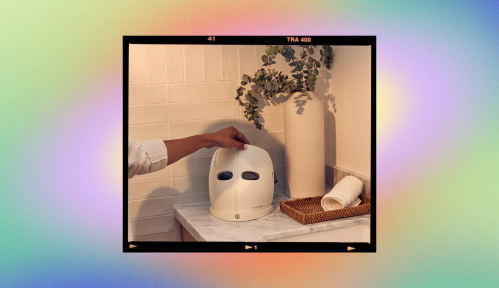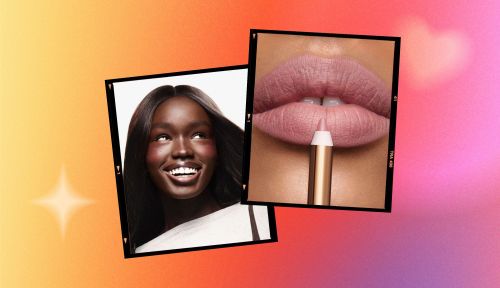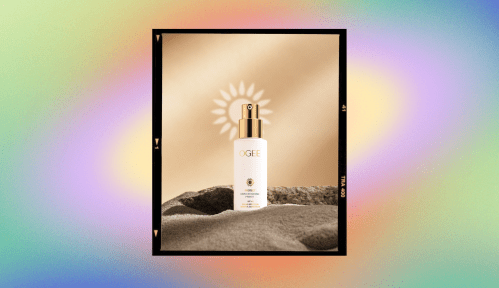Our editors independently select these products. Making a purchase through our links may earn Well+Good a commission
How Lush—Known for Its Mall-Era Storefronts and Glittery Bath Bombs—Set the Blueprint for What Beauty Has Become in 2023
What truly makes Lush shine is its commitment to ethical sourcing, sustainability, social causes, and self-care.
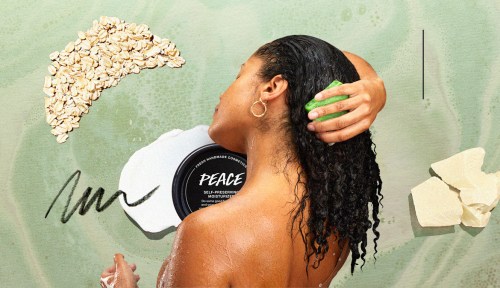
The first time I stepped foot in a Lush store, I was 16. The bright products and intoxicatingly sweet scent drew me in, and I came out the proud owner of face masks so fresh I had to store them in the refrigerator and neon bath bombs that I could not wait to drop in the tub. I tried each of the different mask formulas, saving my containers knowing that after five I could bring back my empties for a new one. My friends and I became engrossed with what we thought of as the coolest beauty brand, like, ever.
Experts in This Article
chief ethics officer at Lush North America
head of sustainability at Lush North America
co-founder of Lush
But little did we know, Lush’s greatness went far deeper than its irresistible products. Those bath bombs do more than turn your water into an intergalactic blend of vivid pigments and glitter—they elevate your bath routine into a ritual without using any plastic. And that empty-pot return policy wasn’t just a ploy to incentivize me to buy more—it was a way for Lush to create truly circular packaging, reusing the same plastics over and over.
Since its launch in 1995, Lush was never just a beauty company. As deliciously innovative as the products are, they’re actually the least impressive part of the brand. What truly makes it shine is its commitment to ethical sourcing, sustainability, social causes, and self-care.
“From the very start, we’ve had a hippie culture in the business,” says Rowena Bird, one of Lush’s six co-founders. “When we were first starting, we were just concentrating on being able to make a business and survive. Then within a couple of years, as it grew bigger, we knew that we wanted to set a standard that we would all work to, and then a big group of us created the ‘We Believe‘ [statements] where we wrote down all the things that we actually do believe in, that we knew that we wanted to work to.”
The statements covered things like using fresh and organic ingredients and testing products exclusively on humans (never animals), and in the years since they were crafted, have remained at the heart of what the brand stands for. “We’ve always stuck with the ethics that we started the business with, and then we’ll put additions onto it when we think ‘now we can do this,’ or ‘we should be doing that,'” says Bird. “It’s quite good fun.”
This ethos has solidified Lush as an industry leader for the past three decades, and the brand’s dedication to doing things right is a masterclass that others in the beauty space can learn from.
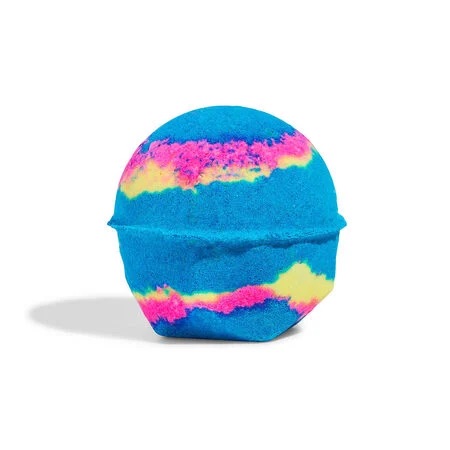
Lush, Intergalactic Bath Bomb — $9.00
Product innovation that has paved the path for what beauty looks like in 2023
Wild harvested ingredients. Solid, waterless products. Caring for the skin microbiome. Focusing more on how you feel than how you look. Packaging recycling programs. Lush spearheaded these practices—and stuck to them—long before they were cool.
“There is this real sense of innovation at Lush, and a willingness to push the envelope, try new things, invent new products that, for example, can take the water out of a formula to create solid products that require no packaging,” says Katrina Shum, head of sustainability at Lush North America. “And you know, some of them work, some of them don’t work. But we’re willing to test them and bring that as a conversation to the market and challenge other companies as well just to shift what we’re all putting out into society.”
This commitment to innovation has allowed Lush to make some seriously cool products—even if they happened by accident.
“The solid bubble bar that we do—that was an accident,” says Bird. Lush co-founder and inventor Helen Ambrosen “was making deodorant and left it in a jug in the sink overnight. And then she came back in the next day and it had gone solid in the jug. And as she was washing it, all these bubbles were coming out and she was just like, ‘Oh my word. I’ve invented a solid bubble bath.'”
The solid bubble bar is one of the many “Naked” products that have become the cornerstone of the Lush brand. One of the most recent launches is a new solid co-wash bar, designed for those with textured hair. Because the solids are waterless, they can be packaged without plastic—which means they are lightweight and can be transported with less of a carbon footprint— and don’t require the use of preservatives, which can disrupt the skin microbiome. “We do take your skin care and your skin biome very seriously, and that’s what we are creating the products around,” says Bird.
And while the brand is known for its fresh face masks and fabulous solid bath products and shampoos, it does so much more. You can shop for everything from eye masks ($5) and candles ($18) to tubeless, naked mascara ($14).
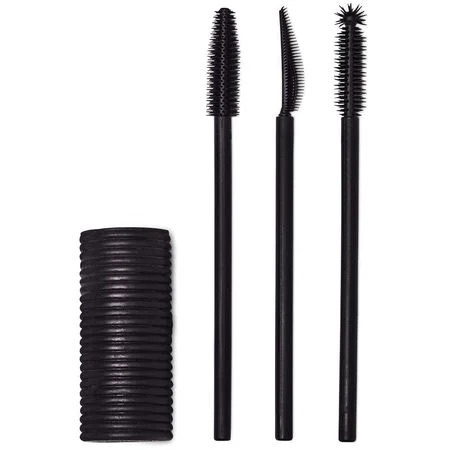
Lush, Naked Mascara in Orca — $14.00
Commitment to sustainability that goes beyond greenwashing
As you may have gleaned from the brand’s dedication to solid products and minimal packaging, Lush walks the walk when it comes to sustainable practices—there’s no greenwashing or beauty B.S. here.
“Our big vision is around leaving the world lusher than we found it,” says Shum. “We talk about leading the revolution to save the planet across three areas. There’s the earth-care planet side, caring for people, and then there’s the animal piece of it.”
Lush is able to commit to these causes because it controls every single part of its business. The team is constantly working to decrease energy consumption and utilize renewable energy—for example, they reduce emissions by transporting their products by trains instead of planes—and all of the brand’s packaging materials are regenerative and circular. Plus, they stand up for climate justice.
“It’s looking at that intersectionality between climate and people and political societal issues, and really taking a climate justice lens to whatever we do—whether it’s a renewable energy purchase or whether it’s materials that we’re working with,” says Shum. For example, the Lush team is intent on decreasing plastic use because they understand the impact that plastic production can have on communities. Shum points to Cancer Alley, a section of the Mississippi River where residents are exposed to emissions from over 150 petrochemical facilities.
“The communities that are living around the Mississippi are often lower-income communities and communities of color—it’s not fair,” she says. “We touch these upstream and downstream impacts when it comes to plastics and waste—we can control it by using a hundred percent post-consumer recycled content. We can control it by promoting our ‘Bring It Back’ program and getting people to bring their pots back, which then go to facilities in Vancouver and Toronto where we re-grind and make them into new plastics so that we’re not adding to the upstream impacts of creating plastics from petrochemicals.”
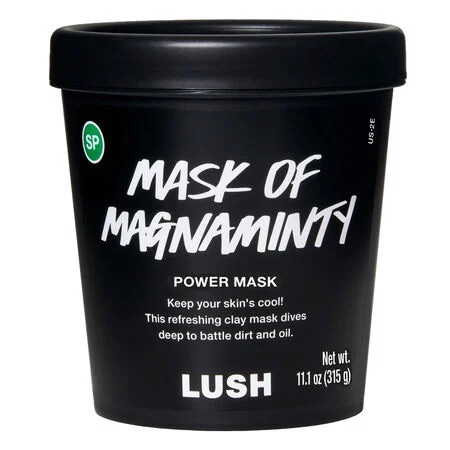
Lush, Mask Of Magnaminty—Self-Preserving — $17.00 to $55.00
I got to see how Lush recycles its products during a visit to its international headquarters in Poole, a coastal town on the southern coast of England where the brand was created. As I quickly learned: Nothing goes to waste. The plastic molds that are used to shape the bath bombs and shampoo bars, for example, are used until they stop working—and are then shredded and melted down to create more molds.
Beyond producing less waste, Lush also strives to better the environments it interacts with. The brand is committed to understanding the biodiversity and ecosystems of the areas it sources its natural ingredients, and the team works with farmers to make sure they’re interacting with these environments in a way that’s symbiotic, not extractive.
“We are really invested in the raw materials and looking at how can we change the agricultural processes or how can we support some of the stuff that’s already happening,” says Shum. “Sometimes that’s wild harvesting certain raw materials that also help to protect that ecosystem and provide a livelihood. We consider what are the co-benefits of helping to change and transform an agricultural system or support an agricultural system that is really doing good work.”
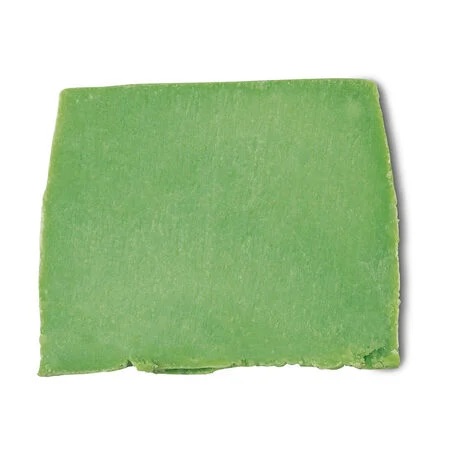
Lush, Co-Wash in Avocado — $19.00
Striving to be better
Lush is able to continuously push the envelope because it’s completely independent. By retaining control of every aspect of the business, the brand is able to work within its own vision.
“We have absolutely no intention of floating on the market,” says Bird. “Shareholders might go ‘No, you can’t do these without packaging because people expect to have packaging on their product.’ Well, no, we’re gonna make it naked. We’re gonna do it solid. We’re going to use beautiful ingredients. Our products themselves will cost more than most other products on the market because of the ingredients we are using. We are not bulking things out with cheap ingredients. But we can do that because we don’t answer to anybody but ourselves.”
The way Lush conducts itself has—and will continue to—impact the way other companies exist in the space and what consumers expect from the brands they shop.
“The hard-earned money that you are spending on your beauty routine is not just going to the purchase—it filters all the way down the supply chain. With your purchase, you are funding growers and producers beyond plastic and profit,” says Halls. “We want to take the worry away from our customers so they know that when they shop at Lush they are doing no harm to people, animals, or the planet. And once you start to align your values with those of like-minded brands out there, you will find yourself being a more mindful consumer.”
Sign up for the Well+Good SHOP Newsletter
Get exclusive deals on wellness, beauty, fitness, and food products that have been hand-picked by our editors.
Got it, you've been added to our email list.

